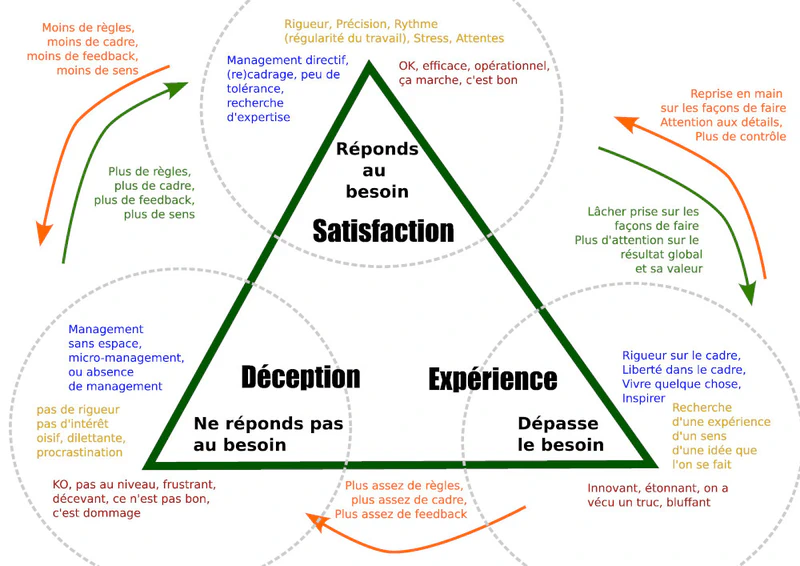Whether it’s about work, professional teams, groups of friends for music, or sports, I’ve formed an idea about the imposition of management. Perhaps it’s just a conviction based on bias, because the older I get, the more I find myself riddled with contradictions (for every answer I give to a question, in the moment that follows, a very different, even contradictory answer comes to mind…). I would say, however, that this one, this thought, comes back to me regularly, and, even if all of this remains empirical, I’m ready to defend it. Moreover, there probably exists a theoretical model somewhere that eludes me and that puts this down in black and white, proof in hand, much better than I can.
If I exaggerate the point, I often observe three types of situations. Whether it’s again about management in a professional context, or something else in a non-professional context. As I write this article to you, I tell myself that I’m rewriting the same thing for the hundredth time, but isn’t that the job - to sift and re-sift one’s thoughts?
Three situations. A failure situation, a success situation, a success situation with a dense experience, an experience. These three states I observe and I live them. I picked up my pen and I scribbled.

Doesn’t meet the need
- Management without space, micromanagement, or absence of management
- no rigor, no interest, idle, dilettante, procrastination
- Result: KO, not up to par, frustrating, disappointing, it’s not good, it’s a shame
Meets the need
- Directive management, (re)framing, little tolerance, search for expertise
- Rigor, Precision, Rhythm (regularity of work), Stress, Expectations
- OK, effective, operational, it works, it’s good
Exceeds the need
- Rigor on the framework, Freedom within the framework, Living something, Inspiring
- Search for an experience, a meaning, an idea that we have
- Innovative, surprising, we lived through something, amazing
The transitions
- Rising from disappointment to satisfaction: More rules, more framework, more feedback, more meaning
- Rising from satisfaction to experience: Letting go of ways of doing things, more attention on the overall result and its value. Giving space.
- Falling back from experience to satisfaction: Taking back control of ways of doing things, Attention to details, More control
- Dropping from satisfaction to disappointment: Fewer rules, less framework, less feedback, less meaning
- Getting bogged down from experience to disappointment: Not enough rules anymore, not enough framework anymore, not enough feedback anymore
Some reflections
- Must one necessarily pass through satisfaction before experience? It seems so to me, but it’s not a certainty.
- What’s difficult, between satisfaction and experience: letting go when the previous phase demanded the opposite. The contradictory aspect between the firmness of the framework and vision, and the freedom and space necessary within it.
- Always ask yourself: where am I?
Conclusion
I threw this down haphazardly Sunday evening. It resembles many things already written by others and by me. But I needed to lay it down again. Perhaps differently. Once again I never stop handling this material to occasionally discover something new or revise my thinking.